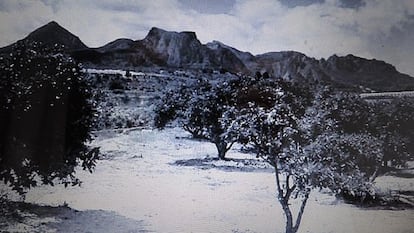Coastal communities fight concrete onslaught with organic activism
Pioneering scheme in Altea, Alicante encourages agricultural self-sufficiency

As Spaniards become increasingly concerned about what they eat, many are turning to food production methods that favor locally grown, organic produce.
?Part social protest, part environmental activism, part alternative politics, for local communities this movement can also be a way of preserving their identity as well as their landscape - or at least trying to.
This is especially true along the Mediterranean coast, where unbridled real estate development swept away much of the traditional farmland. Benidorm, a once-sleepy seaside village that is now second only to Manhattan in skyscraper density, is the classic example of this building frenzy.
Now, politicians and environmentalists in the area are teaming up to preserve what is left of the farmland for as long as they can, through programs that support local farmers and encourage residents to consume their products, or even grow their own.
Altea, a small town on the coast of Alicante, is about to launch a pilot scheme that lends residents a plot of land so they can sow, grow and harvest their own produce. Town authorities will even provide the seeds, the tools and expert advice for the inexperienced farmer. The condition is that participants must respect organic agriculture criteria and grow food for their own consumption, not for sale.

Besides encouraging sustainable agriculture, another goal of the program is to put derelict land to good use. That is why the 13 individual plots - plus one for every school in Altea - are located within city limits on land that is currently not used for any practical purpose.
"There are abandoned plots within city limits that have turned into waste dumps and are an eyesore. We encourage owners who are just waiting for their land to be built on to loan us their plots in the meantime," explains Carolina Punset, the promoter of the project, adding that much of Altea's remaining unbuilt land is already rezoned and set for construction in the near future.
Punset, the local chief of agriculture, is also the only council representative of a new independent party called Ciudadanos por Altea (Citizens for Altea), which first ran in local elections in May 2007 as an alternative to the majority Popular Party and Socialist Party.
Since her appointment, Punset has headed several sustainable agriculture projects, such as making Altea the first Valencian municipality to ban genetically modified food, or creating an indigenous seed bank with support from the local farming cooperative.
"The organic gardens will also serve a social purpose by bringing Spaniards and immigrants together; and it will also be good for elderly people, so they are not stuck inside their homes all day," adds Punset, who is the daughter of Eduard Punset, a prominent politician and the host of a popular science show on public broadcaster TVE.
Authorities will provide seeds,tools and advice for budding farmers
If things go well, Punset hopes to expand the program - which is partly funded by Fundaci¨®n Biodiversidad - mirroring the nearby town of Ibi, where there are already 58 organic gardens in operation.
In the meantime, there is another pioneering initiative set to begin in February: "Tu Mateix," a program modeled after the North American and European tradition of picking your own fruit on the grower's premises.
"We had to clear all kinds of legal hurdles because of the lack of pick-your-own tradition in Spain," says Punset, who eventually got four farming estates to participate. "Farmers were wary of allowing people onto their land because they were concerned about things like accidents, or even theft."
Altea is not the only town experimenting with eco-friendly food production. There are currently 70 cooperatives and associations across Spain that supply locally grown, organically farmed produce, in some cases at lower costs than supermarkets and conventional grocers.
The first sprang up in Catalonia 30 years ago, but the phenomenon has spread rapidly recently, as people grow increasingly concerned about what they eat, their impact on the environment and the lopsided economics of the modern-day food industry in which farmers receive a small fraction of the earnings of distributors.
"The products have to fit three criteria: local, organic and fair," explains Isidro Jim¨¦nez, a representative of the Consume hasta Morir association set up by environmentalist group Ecologistas en Acci¨®n, which is also providing the experts for Altea's organic gardens.
"Organic farming is the only chance farmers have at a decent salary," confirms Punset, underscoring that for many of them it is simply not worth it to grow and harvest their crops anymore.
Ultimately, she says, organic food could also help Altea's economy by providing a distinct product. "Altea is the jewel in the crown compared with Calpe or Benidorm," she says, in reference to the town's relatively unspoilt look. "This could encourage a new form of eco-tourism."
Tu suscripci¨®n se est¨¢ usando en otro dispositivo
?Quieres a?adir otro usuario a tu suscripci¨®n?
Si contin¨²as leyendo en este dispositivo, no se podr¨¢ leer en el otro.
FlechaTu suscripci¨®n se est¨¢ usando en otro dispositivo y solo puedes acceder a EL PA?S desde un dispositivo a la vez.
Si quieres compartir tu cuenta, cambia tu suscripci¨®n a la modalidad Premium, as¨ª podr¨¢s a?adir otro usuario. Cada uno acceder¨¢ con su propia cuenta de email, lo que os permitir¨¢ personalizar vuestra experiencia en EL PA?S.
?Tienes una suscripci¨®n de empresa? Accede aqu¨ª para contratar m¨¢s cuentas.
En el caso de no saber qui¨¦n est¨¢ usando tu cuenta, te recomendamos cambiar tu contrase?a aqu¨ª.
Si decides continuar compartiendo tu cuenta, este mensaje se mostrar¨¢ en tu dispositivo y en el de la otra persona que est¨¢ usando tu cuenta de forma indefinida, afectando a tu experiencia de lectura. Puedes consultar aqu¨ª los t¨¦rminos y condiciones de la suscripci¨®n digital.








































